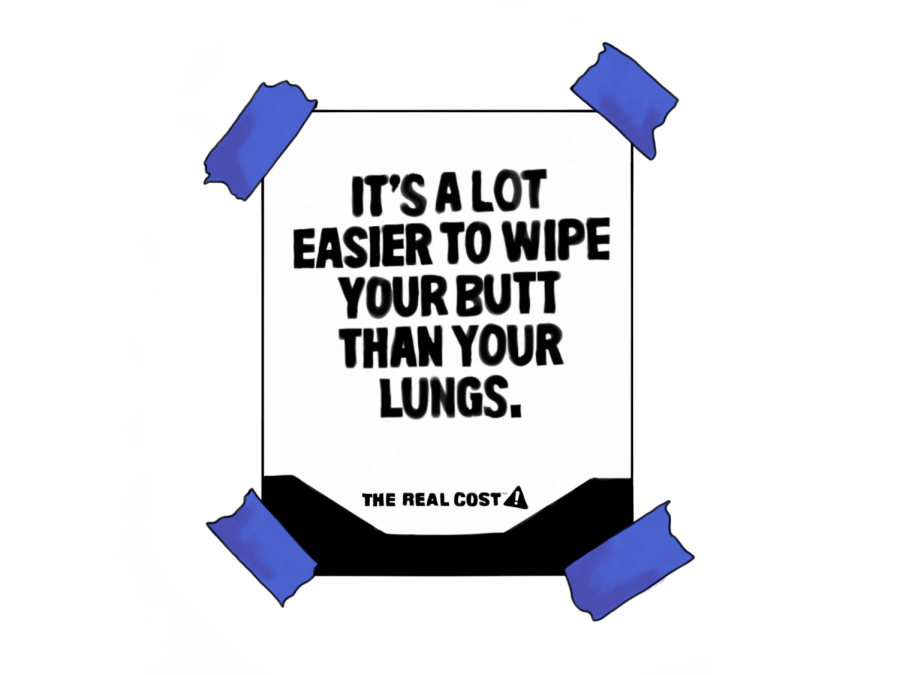Make Good Choices!
What the administration has done to combat juuling.
44% of survey respondents say that the recent events and articles regarding the health risks of the Juul have prevented them from trying or using the Juul.
“Some of the grossest things in the bathroom are in that vape.” “It’s easier to wipe your butt than your lungs.” “Strangely enough, some people come here to put crap into their bodies.” These are just some of the things on posters that Bishop’s has put up in the bathrooms around campus this year.
In the last few months, many articles have come out raising concerns about the dangers of vaping. The United States Center for Disease Control (CDC) published an article on November 9 saying, “2,051 cases of e-cigarette, or vaping, product use associated lung injury (EVALI) have been reported to CDC.” Their report established that the “CDC recommends that you do not use e-cigarette, or vaping, products that contain THC.” THC is a natural component of marijuana.
With a new article about health concerns published practically every day, it begs the question of how students in the Bishop’s community are responding to growing concerns about vaping. What has the administration and faculty done to try and combat this issue?
Because of the recent news about health concerns of vaping, School Counselor Ms. Megan Broderick (‘98) has discovered that “some behaviors seem like not a big deal, and I think we’re finding out that [juuling] is a big deal.” Because of these concerns, the administration is working to combat vaping on campus. Ms. Broderick is finding that “it is a difficult issue to fight” because vaping is so undetectable because of its lack of noticeable smell and smoke. They have put up the posters around campus, but only 12 percent of the 199 students who responded to the survey said that the posters in the bathroom have prevented them from trying or using the Juul.
Their main goal right now is to raise awareness of the health risks. Pediatrician and Bishop’s parent Dr. Wendy Hunter gave a health seminar to the freshmen and sophomores about the negative effects of vaping. Will Keefe (‘23) said, “it was very interesting because she explained the scientific side of vaping, especially what scientists think are causing the illnesses.” In her speech, psychologist and researcher Dr. Tasha Wade mentioned that lung diseases from vaping might be caused by burns on the lungs. In an interview with the New York Times, Dr. Brandon T. Larsen, a surgical pathologist at the Mayo Clinic in Scottsdale, Ariz said, “to be honest, they look like the kind of [burns] you would expect to see in an unfortunate worker in an industrial accident where a big barrel of toxic chemicals spills, and that person is exposed to toxic fumes and there is a chemical burn in the airways.”
Additionally, a section on vaping has been added to the ninth grade Health curriculum. Gabi Rosen (‘23) said, “It was really interesting to see what we talked about with Coach Carr in the summer, compared to now with all of the new deaths and lung diseases.”
In a 2017 survey of Bishop’s students conducted by The Tower, 33 percent of survey respondents from the class of 2020 thought that kids who Juul are not aware of the health risks. In 2019, that number has decreased to 4 percent. So, with this increase in awareness, have more students stopped Juuling? In 2017, 28 percent of survey respondents from the class of 2020 claimed that they had used the Juul. In 2019, 27 percent of members of that same class claim that they have used the Juul. Despite the increased awareness of the health risks, the same percentage of students continue to Juul.
The administration has also made it their goal to increase parent awareness. On August 30 of this year, Ms. Broderick sent out an email to parents advising that they “familiarize [themselves] with what a Juul looks like, what a vape pen looks like and what the dangers of using these devices can be.” The email contained pictures of Juuls and other vape pens, as well as links to articles about the health risks associated with vaping. According to the email, it was sent out for the administration and parents to, “work together to impress upon the children in our community that this habit [vaping] is not something they need or want in their lives.” They seem to be on the right track to accomplishing this goal because only 12 percent of survey responses indicated that their parents have not heard of the Juul.
Juuling will continue to be a problem on campus. But, for now, look forward to what the administration will do in the future.

Alex Cotton really enjoys Digestives. They are super good. Alex is particularly fond of their chalky texture and flavor. Her favorite versions are the...







